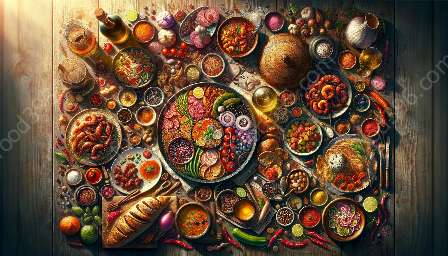German cuisine offers a rich tapestry of flavors, traditions, and cultural influences, making it a captivating topic within the realm of ethnic cuisines. From the hearty and comforting dishes of Bavaria to the delicate pastries of the Black Forest, German culinary traditions are a testament to the country's history and diversity. In this comprehensive exploration of German cuisine, we delve into the origins, key ingredients, iconic dishes, and the social and historical contexts that have shaped this vibrant food culture.
The Historical and Cultural Influences
The history of German cuisine is deeply intertwined with the country's complex cultural and social evolution. The culinary traditions have been shaped by a multitude of influences from various regions, neighboring countries, and historical events. From the ancient Teutonic tribes to the Roman Empire, and from the medieval guilds to the modern era, each era in German history has contributed to the diverse tapestry of flavors and techniques that make up German cuisine.
Moreover, the geographical diversity of Germany, from the coastal regions to the Alpine peaks, has also played a critical role in shaping the country's culinary landscape. Each region boasts its own unique dishes, ingredients, and culinary techniques, resulting in a rich and varied culinary tapestry.
Key Ingredients and Culinary Traditions
German cuisine is characterized by its emphasis on hearty and filling meals, often featuring a range of meats, potatoes, and bread as staple ingredients. The use of vegetables, such as cabbage and root vegetables, is also prevalent in many traditional German dishes. Additionally, German cuisine is celebrated for its skillful use of herbs, spices, and condiments, adding depth and complexity to its flavorful offerings.
One notable aspect of German cuisine is the art of sausage-making, with an array of sausages forming an essential part of the culinary tradition. From the iconic bratwurst to the spicy currywurst, sausages hold a special place in the hearts of both locals and visitors alike. The sausage-making tradition in Germany has been honed over centuries, resulting in a diverse and delectable range of sausages that showcase the country's culinary prowess.
Iconic Dishes and Culinary Delights
German cuisine is renowned for its iconic dishes that have become synonymous with the country's culinary identity. The classic schnitzel, a breaded and fried cutlet, is a beloved dish that has found its way onto menus around the world. The crispy exterior and tender meat of the schnitzel exemplify the skillful art of German cooking.
Another staple of German cuisine is the comforting and hearty stew known as sauerbraten. This dish, featuring marinated and slow-cooked meat, reflects the time-honored traditions of slow cooking and braising that have been perfected over generations.
No exploration of German cuisine would be complete without mentioning the country's renowned baking traditions. German pastries, such as the decadent Black Forest cake and the delicate streusel, showcase the country's expertise in the art of pastry-making.
Social Significance and Culinary Traditions
German cuisine is not merely a collection of recipes and dishes; it is deeply intertwined with the social fabric of the country. Food and dining play a central role in German social life, serving as occasions for family gatherings, celebrations, and community events. The communal experience of sharing a meal is highly valued in German culture, with dining often seen as an opportunity for bonding and fostering relationships.
Furthermore, the importance of seasonal and local ingredients in German cuisine reflects the country's commitment to sustainability and environmental consciousness. Many traditional dishes are designed to make use of locally available ingredients, reflecting an age-old tradition of resourcefulness and respect for nature.
Conclusion
German cuisine, with its rich history, diverse flavors, and social significance, stands as a testament to the country's culinary heritage. From the rustic flavors of the countryside to the refined traditions of the urban centers, German cuisine offers a truly captivating journey for food enthusiasts around the world.

